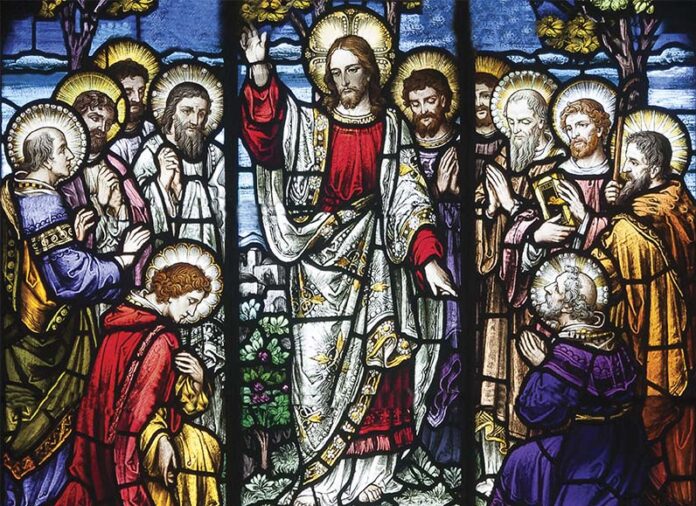Sunday of the 23rd Week in Ordinary Time
See also:
Mass Readings
First Reading – Wis 9:13-18b
Who can know God’s counsel, or who can conceive what the LORD intends? For the deliberations of mortals are timid, and unsure are our plans. For the corruptible body burdens the soul and the earthen shelter weighs down the mind that has many concerns. And scarce do we guess the things on earth, and what is within our grasp we find with difficulty; but when things are in Heaven, who can search them out? Or who ever knew your counsel, except you had given wisdom and sent your Holy Spirit from on high? And thus were the paths of those on earth made straight.
Responsorial Psalm – Ps 90:3-4, 5-6, 12-13, 14 and 17 (R.1)
R. In every age, O Lord, you have been our refuge.
You turn man back to dust,
saying, “Return, O children of men.”
For a thousand years in Your sight
are as yesterday, now that it is past,
or as a watch of the night. R.
You make an end of them in their sleep;
the next morning they are like the changing grass,
Which at dawn springs up anew,
but by evening wilts and fades. R.
Teach us to number our days aright,
that we may gain wisdom of heart.
Return, O LORD! How long?
Have pity on Your servants! R.
Fill us at daybreak with Your kindness,
that we may shout for joy and gladness all our days.
And may the gracious care of the LORD our God be ours;
prosper the work of our hands for us!
Prosper the work of our hands! R.
Second Reading – Phlm 9-10, 12-17
I, Paul, an old man, and now also a prisoner for Christ Jesus, urge you on behalf of my child Onesimus, whose father I have become in my imprisonment; I am sending him, that is, my own heart, back to you. I should have liked to retain him for myself, so that he might serve me on your behalf in my imprisonment for the gospel, but I did not want to do anything without your consent, so that the good you do might not be forced but voluntary. Perhaps this is why he was away from you for a while, that you might have him back forever, no longer as a slave but more than a slave, a brother, beloved especially to me, but even more so to you, as a man and in the Lord. So if you regard me as a partner, welcome him as you would me.
Gospel – Lk 14:25-33
Great crowds were traveling with Jesus, and He turned and addressed them, “If anyone comes to Me without hating his father and mother, wife and children, brothers and sisters, and even his own life, he cannot be my disciple. Whoever does not carry his own cross and come after Me cannot be My disciple. Which of you wishing to construct a tower does not first sit down and calculate the cost to see if there is enough for its completion? Otherwise, after laying the foundation and finding himself unable to finish the work the onlookers should laugh at him and say, ‘This one began to build but did not have the resources to finish.’ Or what king marching into battle would not first sit down and decide whether with ten thousand troops he can successfully oppose another king advancing upon him with twenty thousand troops? But if not, while he is still far away, he will send a delegation to ask for peace terms. In the same way, anyone of you who does not renounce all his possessions cannot be My disciple.”
Featured Saints
Blessed Marie Ste-Cécile de Rome (Dina Bélanger), virgin (†1929). Member of the Congregation of the Religious of Jesus and Mary in Quebec, Canada; for years she patiently endured the illness from which she died at age 32.
St. Boniface I, Pope (†422). He worked to resolve many controversies involving ecclesiastical discipline.
St. Rosalia, virgin (†twelfth century). She left everything to live as a hermitess near Palermo, Italy, of which she is the patroness.
St. Moses, prophet prophet. Chosen by God to liberate the people of Israel from captivity in Egypt and received the tables of the Law, containing the 10 Commandments. He led them to the Promised Land, but died before entering it, leaving his disciple Joshua as the leader of Israel. See:
St. Irmingard, virgin (†1085). Countess of Süchteln, Germany, she adopted a hermetical life and used her inheritance in the construction of many churches.
St. Ida of Saxony, widow (†825). Married to Count Ekbert of Herzfeld, she dedicated herself to caring for the poor and building churches and monasteries.
St. Cuthbert, bishop (†687). After the Synod of Whitby, he became prior of Lindisfarne, and won over the community to Roman customs. His incorrupt remains were enshrined at Durham, which with Lindisfarne has remained a centre of his cult to this day.
























